 Petzlover
Petzlover Black Russian Terrier is originated from Russia but Lhasapoo is originated from United States. Black Russian Terrier may grow 48 cm / 19 inches higher than Lhasapoo. Black Russian Terrier may weigh 54 kg / 120 pounds more than Lhasapoo. Both Black Russian Terrier and Lhasapoo has almost same life span. Black Russian Terrier may have more litter size than Lhasapoo. Black Russian Terrier requires High Maintenance. But Lhasapoo requires Moderate Maintenance
Black Russian Terrier is originated from Russia but Lhasapoo is originated from United States. Black Russian Terrier may grow 48 cm / 19 inches higher than Lhasapoo. Black Russian Terrier may weigh 54 kg / 120 pounds more than Lhasapoo. Both Black Russian Terrier and Lhasapoo has almost same life span. Black Russian Terrier may have more litter size than Lhasapoo. Black Russian Terrier requires High Maintenance. But Lhasapoo requires Moderate Maintenance
 During the cold war, the Soviet Union developed the Black Russian Terrier as a working military dog. During the early 1950’s, the Red Star Kennel developed this breed and in 2004 by the American Kennel Club. The Black Russian Terrier is not really a terrier at all, but a mid-sized working dog used for hunting and guarding or as a pet. The Red Star Kennel is thought to have developed the BRT using a wide variety of breeds – as many as seventeen – including breeds like the Newfoundland, the Rottweiler, the Caucasian Shepard Dog and a Giant Shepard and an Airedale. So, you can see the wide variety and several more breeds were added. The Red Star Kennel in Moscow was owned by the state and they developed the BRT for specific working conditions and not for appearance. They did not really care how it looked except that it had to be black. In 1957 the state allowed a few puppies to be sold to non-military breeders. These breeders began to breed the Black Russian Terrier for appearance as well as function.
During the cold war, the Soviet Union developed the Black Russian Terrier as a working military dog. During the early 1950’s, the Red Star Kennel developed this breed and in 2004 by the American Kennel Club. The Black Russian Terrier is not really a terrier at all, but a mid-sized working dog used for hunting and guarding or as a pet. The Red Star Kennel is thought to have developed the BRT using a wide variety of breeds – as many as seventeen – including breeds like the Newfoundland, the Rottweiler, the Caucasian Shepard Dog and a Giant Shepard and an Airedale. So, you can see the wide variety and several more breeds were added. The Red Star Kennel in Moscow was owned by the state and they developed the BRT for specific working conditions and not for appearance. They did not really care how it looked except that it had to be black. In 1957 the state allowed a few puppies to be sold to non-military breeders. These breeders began to breed the Black Russian Terrier for appearance as well as function.
As these breeders worked with the dogs, they spread the breed throughout Russia and into Finland, Poland, Hungary, Germany, Czechoslovakia and Germany. From there they spread to Australia, Canada and the United States. The breed standard was developed in 1958 and by 1996 an updated version of the standard was developed to reflect the dog we see today. In 1996 the United Kingdom also got their first introduction to the breed. They are still rare outside of Russian or previous Soviet Union states.
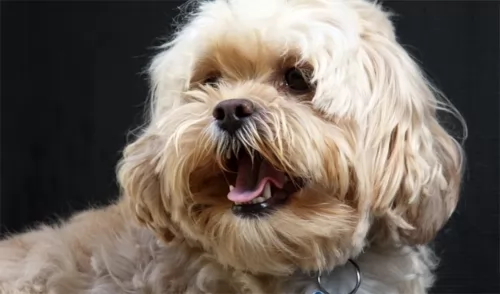 Such a cute, cuddly teddy bear of a dog is popular with everyone who just wants a wonderful canine companion.
Such a cute, cuddly teddy bear of a dog is popular with everyone who just wants a wonderful canine companion.
Both the Lhasa Apso and the Poodle are ancient dog breeds and they are the two breeds that have been used to bring about the Lhasapoo. The Poo has been bred to essentially be an indoor dog.
It would appear as though the Lhasapoo was developed in the United States of America, as in 1933, a pair was given to an American traveler who developed a kennel.
 A little larger than a mid-sized dog, the Black Russian Terrier is strong, powerful, stable and alert. His head is block shaped and has a broad skull. The muzzle is square with a beard and mustache. A black, large nose and full black lips are matched with powerful and large jaws. He has a scissor bite and his ears should be triangles with rounded apexes. They have very large paws that are bear-like in appearance with thick black pads. They are also covered with hair. Their legs are muscular, powerful and strong. They have a cropped tail.
A little larger than a mid-sized dog, the Black Russian Terrier is strong, powerful, stable and alert. His head is block shaped and has a broad skull. The muzzle is square with a beard and mustache. A black, large nose and full black lips are matched with powerful and large jaws. He has a scissor bite and his ears should be triangles with rounded apexes. They have very large paws that are bear-like in appearance with thick black pads. They are also covered with hair. Their legs are muscular, powerful and strong. They have a cropped tail.
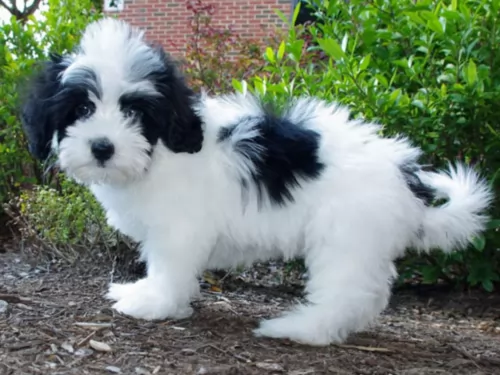 The Lhasapoo is a mix of Poodle and Lhasa Apso. He is a small dog standing between 25–28 cm in height and weighing 4 – 6kg.
The Lhasapoo is a mix of Poodle and Lhasa Apso. He is a small dog standing between 25–28 cm in height and weighing 4 – 6kg.
Known as a designer breed, his small size allows him to adapt to life in the city or to the countryside. He is such a cute little dog with his alert face, his bright brown eyes, short legs and floppy ears.
His coat is thick and dense and can be curly or fairly straight. It comes in a number of solid colors – apricot, tan, cream, brown, white and black or he can be bi-color – any of these colors mixed with white. In fact, as a crossbreed he can inherit the looks of either dogs – the Poodle or Lhasa Poo. Because he has poodle in him, these dogs are sometimes spoken about as being hypoallergenic.
Small and gentle in nature, the Lhasapoo makes a splendid pet and companion for everyone. He is such an amicable small dog, getting on well with both children and other pets in the home.
You can’t really tell what kind of a dog he’ll turn out to be in terms of his character, because he can be quite aloof if the Lhasa side of him is stronger or he could be playful and friendly if the Poodle side of him is stronger.
 The Black Russian Terrier is a working dog and he is confident, calm, self-assured and confident. He is responsive and intelligent, protective and fearless, loyal and aloof. He is not welcoming to strangers. If socialized well, he is enough of an independent thinker to be able to decide on his own who or what poses a threat to his family and what doesn’t. They get bored quickly because they are so smart. Keep him stimulated. These are strong, athletic dogs who will love to run with you, jog along side your bike, hike the mountain or just walk with you. Whatever your form of exercise is, the Black Russian Terrier can adapt to it. They also have a strong prey drive so don’t trust them with animals they do not know. They are ok with cats and dogs that they grow up with. They love to play with kids but be careful they don’t unintentionally knock the little ones down.
The Black Russian Terrier is a working dog and he is confident, calm, self-assured and confident. He is responsive and intelligent, protective and fearless, loyal and aloof. He is not welcoming to strangers. If socialized well, he is enough of an independent thinker to be able to decide on his own who or what poses a threat to his family and what doesn’t. They get bored quickly because they are so smart. Keep him stimulated. These are strong, athletic dogs who will love to run with you, jog along side your bike, hike the mountain or just walk with you. Whatever your form of exercise is, the Black Russian Terrier can adapt to it. They also have a strong prey drive so don’t trust them with animals they do not know. They are ok with cats and dogs that they grow up with. They love to play with kids but be careful they don’t unintentionally knock the little ones down.
The Black Russian Terrier matures later than other dogs. Treat the puppy the way you want the adult dog to be. If you don’t want a large dog on your bed don’t let the puppy sleep on the bed. He will soon be a large, powerful and strong dog with a mind of his own and you will not be able to keep him off the bed.
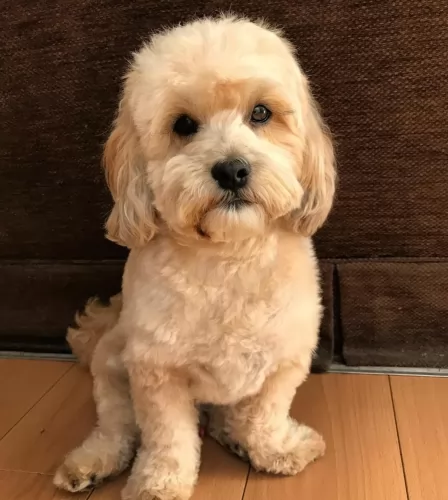 The Lhasapoo is a crossbreed, so you never know what you’re actually going to get – a little bit of Lhasa or a little bit of Poodle.
The Lhasapoo is a crossbreed, so you never know what you’re actually going to get – a little bit of Lhasa or a little bit of Poodle.
One thing is for sure though – you’re going to get the cutest little pet ever. He is a friendly, affectionate dog, but the Lhasa side of him makes him wary of strangers, making him an excellent watchdog.
They have a moderate activity levels and will adapt easily to life in the city or in the countryside, but they will need a walk every day to ensure he doesn’t become unfit and obese.
Lhasapoo puppies are adorable but every cute puppy grows into an adult. Then it’s time to show you’re a responsible dog owner by continuing to love and care for your adult Lhasapoo so that he becomes the wonderful companion he is designed to be.
 This is a healthy breed who faces some of the same issues other large dogs face such as dysplasia in the elbows and hips. Then they also face their own hereditary diseases such as Juvenile laryngeal paralysis, hyperuricosuria and polyneuropathy. They are also susceptible to heart disease, eye diseases, allergies, Panosteitis and hypertropic osteodystrophy. Let’s look at the major hereditary disease that are not so common.
This is a healthy breed who faces some of the same issues other large dogs face such as dysplasia in the elbows and hips. Then they also face their own hereditary diseases such as Juvenile laryngeal paralysis, hyperuricosuria and polyneuropathy. They are also susceptible to heart disease, eye diseases, allergies, Panosteitis and hypertropic osteodystrophy. Let’s look at the major hereditary disease that are not so common.
This occurs when the larynx arytenoid cartilages stop working and don’t operate so then the adjoining muscles don’t work either and the dog cannot swallow without the possible damage to the airway and the cannot breathe properly during exercise or while panting.
This is a condition that can occur in people and animals. This condition can lead to kidney or bladder stones as there is too much uric acid in their urine.
Like any form of neuropathy, in this disease many different nerves are damaged, and this can cause weak reflexes and tremors. There are effective treatments however.
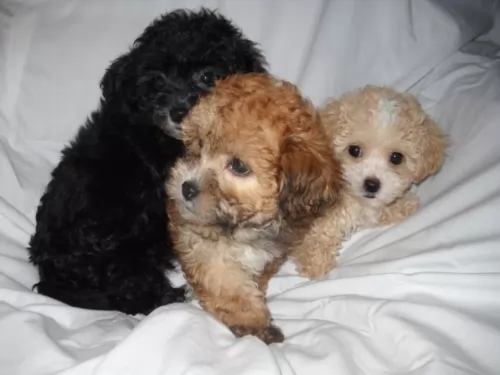 All dogs have the potential to become ill but when you give your dog the best chance to eat well and he is loved and cherished, he can live a long life.
All dogs have the potential to become ill but when you give your dog the best chance to eat well and he is loved and cherished, he can live a long life.
The Lhasapoo can live to be 15 years of age if you treat him well and ensure that he has a healthy diet. Of course as a crossbreed, his chances of developing inherited diseases is limited.
Watch out for Bloat, particularly if your pet gobbles up a large bowl of food. It is better to feed him 2 smaller meals a day. There are some time-releasing food bowls available for pets to encourage slower eating.
With Bloat, you’ll notice your pet’s stomach is swollen up. Complications set in when the stomach turns or twists as fluid and air can’t escape. Your dog will also be restless, drooling and trying to vomit. Bloat is a life-threatening illness.
This can be a complication from disease or medications even. It is important to keep your pet’s teeth healthy as chronic kidney disease can be caused by dental disease too. Bacteria from the diseased teeth and gums enters bloodstream and damages vital organs like the kidneys.
 This is a large, working dog that needs healthy nutrition. Feed once or twice a day but do not overfeed. Don’t let your Black Russian Terrier get overweight. Proper nutrition for puppies is critical given the nutrionally based diseases discussed below.
This is a large, working dog that needs healthy nutrition. Feed once or twice a day but do not overfeed. Don’t let your Black Russian Terrier get overweight. Proper nutrition for puppies is critical given the nutrionally based diseases discussed below.
This is a high energy dog that needs to work. He doesn’t just want to work, he needs to work. So, find him a job and one that includes a lot of exercise. He needs consistent and firm training but will respond well and excel in Obedience Trials. They are good at Schutzhund and agility. They need plenty of exercise and will be unhappy and destructive without enough and a job. He needs to burn off that energy.
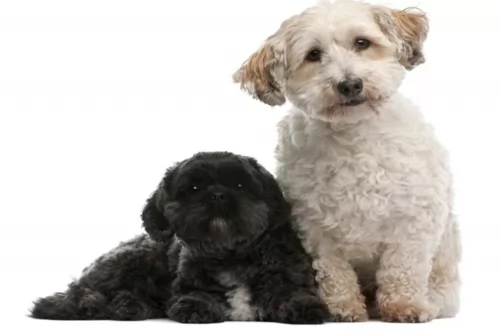 The Lhasapoo is a dog breed that likes to spend time indoors. Because of his looks, his human family members will no doubt be vying for his attention and playing indoor games with him. It will do him good to get out for a walk every day as this gives him the chance to sniff around and smell different things and experience life outside his home.
The Lhasapoo is a dog breed that likes to spend time indoors. Because of his looks, his human family members will no doubt be vying for his attention and playing indoor games with him. It will do him good to get out for a walk every day as this gives him the chance to sniff around and smell different things and experience life outside his home.
The Lhasapoo isn’t a big eater and he will require top quality food for small breeds. He isn’t a big meat eater so a tiny bit of cooked chicken, rice and vegetables chopped up nicely and added to his kibble from time to time will keep him healthy and happy.
Being the crossbreed that he is, you can’t be too sure about the type of coat your Lhasapoo will have. It can be curly, wavy or straight. Most inherit curls.
A Lhasapoo coat looks wonderful when it has been professionally groomed, and then in between grooming, his coat will need to be brushed to prevent tangling. While you’re brushing him, check his eyes too. Sometimes he can develop tear stains beneath the eyes and you can wipe gently around his eyes.
Other grooming for your cute little dog includes having his nails clipped as well as checking inside the ears for infection. Excess wax and dirt can result in an ear infection. You’ll notice your pet shaking his head, the insides of his ears might be red and he wants to scratch his ears. Get him to the vet who will show you how to keep his ears clean and dry.
Also, brush his teeth with special canine toothbrush and toothpaste. Dental disease won’t only damage his teeth, it can cause problems with other parts of the body too.